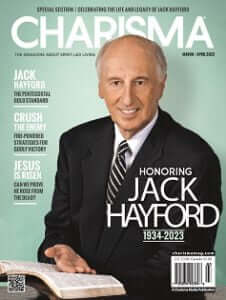I have had the blessing of being able to travel around the world teaching in many synagogues and churches.
One of my favorite things to do while I am sharing is to hold a question and answer session, which is something I do at my home synagogue every Saturday morning. Quite often as I am sharing, especially at churches, someone will ask me about my commitment to pursue a lifestyle that honors the Torah.
The question is usually presented something like, “Why do you feel a need to observe the Old Testament/Covenant commandments seeing that we live within the New Testament/Covenant?”
Over the years, I have answered this question in different ways, but in recent years, this is how I answer this question. I ask them if they are familiar with Leviticus chapters 9 and 10, which are the chapters dealing with the inauguration of the Tabernacle in the Wilderness. Before I go on, let me remind you that all of the people who were gathered around the Tabernacle at its dedication were people who had been redeemed by G-D from Egypt and crossed the Red Sea on dry ground, which 1 Corinthians 10:1-2 relates to immersion/baptism:
“For I do not want you to be ignorant, brothers and sisters, that our fathers were all under the cloud and all passed through the sea. They all were immersed into Moses in the cloud and in the sea.”
Also, each of these people, both the children of Israel and the mixed multitude, had entered into the covenant with G-D having said these words in Exodus 19:8: “Everything that Adonai has spoken, we will do.” To put this into modern context, these people all had realized they were in slavery and cried out to G-D. G-D heard their cries and delivered them from their slavery. They went through the waters of immersion and accepted that G-D was their Lord and Savior.
Now that you understand the context of Leviticus 9 and 10 and its relationship to us as believers, I will go on with my explanation. The people who we read about in Leviticus 9 and 10 have been saved by G-D and have entered into a covenant with G-D. At this point in the Torah, the Israelites have built a beautiful tabernacle for worship and have gathered for the very first offering to be made. Once the priests completed all of the preparations for the offering, we read these words:
“Fire came out from the presence of Adonai, and devoured the burnt offering and the fat on the altar. When all the people saw it, they shouted and fell on their faces” (Lev. 9:24).
What an amazing sight that must have been. The priests followed G-D’s instructions exactly as they were given and the result was G-D accepting the offering and the people all fell to the ground in worship and awe.
However, the next event that we read about is another offering that is given by Nadab and Abihu, the sons of Aaron the priest. After their offering, we read a very similar passage to the one above. However, while the wording is similar, the differences in the wording are very important.
“So fire came out from the presence of Adonai and consumed them. So they died before Adonai” (Lev. 10:2).
Notice in both cases an offering was being made, and in both cases fire came out from the presence of G-D. However, the difference comes in what the fire does. In the case of the offering that was presented according to G-D’s instructions, G-D accepted and consumed the offering, which resulted in G-D’s people entering into worship. In the case of the offering that was made inappropriately and contrary to G-D’s instructions, it resulted in G-D’s rejection of the offering and the fire consumed those who made the offering in a way that violated G-D’s commandments.
I believe these passages of the Bible were included so that we would learn how to present sacrifices and offerings to G-D, primarily the offering of ourselves, which I believe we do by making G-D L-RD and Master of our lives. We must offer our lives as sacrifices to G-D by following His instructions, or His Torah commandments.
When we do so, our offering is acceptable and can be consumed. However, if we do not offer ourselves according to G-D’s instructions, the fire of G-D will, in a spiritual way, consume us instead of our offering.

“I urge you therefore, brothers and sisters, by the mercies of God, to present your bodies as a living sacrifice—holy, acceptable to God—which is your spiritual service.”
Or, as one speaker once said, “When we stand before G-D, we will either hear ‘Well Done,’ or we will be well done.”
The bottom line is that as a believer, I want to truly offer my life as a sacrifice to G-D, and as such, I try to follow as many of His commandments as possible so that my offering is acceptable to G-D and causes other people to fall down in worship of Him in absolute and complete awe.
Bring Charisma magazine home with a subscription today!
Eric Tokajer is the author of “Overcoming Fearlessness,” “What If Everything You Were Taught About the Ten Commandments Was Wrong?,” “With Me in Paradise,” “Transient Singularity,” “OY! How Did I Get Here?: Thirty-One Things I Wish Someone Had Told Me Before Entering Ministry,” “#ManWisdom: With Eric Tokajer,” “Jesus Is to Christianity as Pasta Is to Italians” and “Galatians in Context.”














































